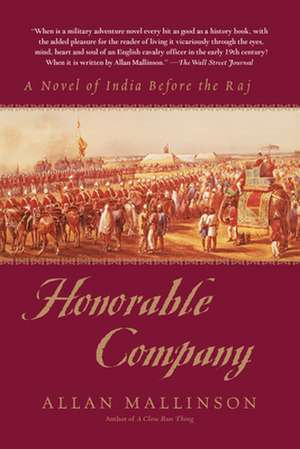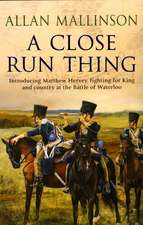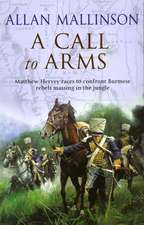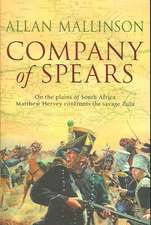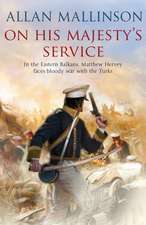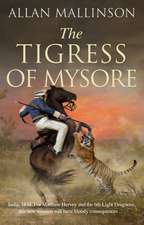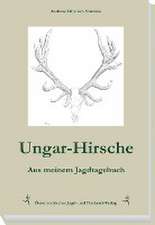Honorable Company: A Novel of India Before the Raj
Autor Allan Mallinsonen Limba Engleză Paperback – 31 oct 2001
As Wellington’s new aide-de-camp, Matthew’s covert mission will embroil him in the jostling of native potentates and England’s encroaching East India Company — both threatened by lawless bands of horsemen bent on plunder and massacre.
When Matthew’s journeying leads him to the small key state of Chintal, he thinks himself close to his objective. But at the rajah’s sumptuous court, he discovers that war in India is waged as often with money and spies as with the clear-cut tactics of the battlefield — with battles won through devious conversations and murderous perfidy. And Matthew, torn between his honor and his destiny, is drawn deeper into the court’s serpentine coils than he ever dreamed....
Preț: 115.92 lei
Nou
Puncte Express: 174
Preț estimativ în valută:
22.18€ • 23.16$ • 18.32£
22.18€ • 23.16$ • 18.32£
Carte disponibilă
Livrare economică 25 martie-08 aprilie
Preluare comenzi: 021 569.72.76
Specificații
ISBN-13: 9780553380446
ISBN-10: 0553380443
Pagini: 320
Dimensiuni: 151 x 232 x 18 mm
Greutate: 0.44 kg
Editura: Bantam
ISBN-10: 0553380443
Pagini: 320
Dimensiuni: 151 x 232 x 18 mm
Greutate: 0.44 kg
Editura: Bantam
Notă biografică
Allan Mallinson is a serving cavalry officer in the British army and the author of Light Dragoons, a history of British cavalry. He lives with his wife and two daughters in Rome, where he is military attaché.
Extras
Chapter 1: THE AIDE-DE-CAMP
The Embassy of His Britannic Majesty to the Court of the Tuileries
Paris, August 13, 1815
Captain Matthew Hervey had put on his best uniform. It was only the second time he had worn it. He was not even sure he should be in levee dress, for his orders to report to the Duke of Wellington’s headquarters had not been concerned with trifles. Yet dress, to a cavalryman in his situation, could hardly be a matter of indifference, and so he had followed the regiment’s maxim that no senior officer could be affronted by seeing an excess of uniform, even if he were bemused by it. The newest captain of the 6th Light Dragoons was therefore waiting in an anteroom, with dress sabertache and Mameluke hanging long from his girdle, and tasseled cocked hat, with its ostrich feathers, under his arm, in some degree of apprehensiveness. He wore no aiglets, however. He had bought two pairs in London on learning that he was to be promoted and appointed to the duke’s staff, but he did not yet presume to wear those coveted insignia of an aide-de-camp. Indeed, his astonishment at his preferment was scarcely less than when first he had comprehended it only two days ago at the Horse Guards.
Lying full across the open doorway of the anteroom was a springing spaniel, old and ill-smelling, sound asleep and snoring with perfect regularity and constant pitch. It had not been in the least disturbed when the Staff Corps corporal had shown the new ADC into the room a quarter of an hour before, when both had had to step long over the outstretched animal to avoid entanglement of spur and coat, and Hervey, waiting in the otherwise silent embassy, pleased to find some distraction which might help keep his mind from disquiet, was now timing the length and interval of these snuffling crescendos and decrescendos by the ticking of the clock on the chimney piece. There were five seconds for the inspiration, three for the equipoise, and four to complete exhalation — then a further five, where all life seemed suspended, before the sequence was repeated da capo. He had counted a dozen of these recitals before seeming suddenly to realize what he was doing. He glanced about anxiously to see if anyone were there, then snapped back to the full attentiveness appropriate for an officer awaiting interview with the commander in chief of the allied armies in France.
Outside, the Sunday bells which had drowned even the sound of hooves on the pavée as he had driven to the rue Faubourg St.-Honoré had been silent for some time now, and he was relieved that he might thereby be able to hear the duke’s remarks, when they came, with absolute clarity. He was in no doubt of the singularity of his position. He was certain that in the whole of the army there could not be an officer below field rank who would not envy him it. Another quarter of an hour passed, the keen anticipation of the honor to come increasing with every minute. Shortly after eleven-thirty a minor commotion in the antehall alerted him to the duke’s return from his daily ride, though it did not disturb the recumbent spaniel. He snapped his whole body to attention, as well as his wits. And then the field marshal was there, at the doorway, looking directly at him. Hervey stepped forward sharply, halting three paces from him, the spaniel occupying all that remained, and bowed his head briskly. The duke made none by return, neither did he extend his hand, saying instead simply, “Captain Hervey, I am glad you are come. Colonel Grant has need of you. He will be along presently. It will be deuced tricky work, but I should not ask it if I thought it beyond you. Good day, then, sir.”
As the duke turned, Hervey saw the young woman in riding dress close by him. She cast a brief backward glance as he said something to her, and then she smiled wide and adoringly at the great man as they retired to his quarters. The spaniel woke suddenly and looked up at Hervey with a puzzled expression before breaking wind at considerable length. Hervey sighed as long, and smiled. How the glamoury of aiglets could be so rudely abraded! And how trifling did the appointment of aide-de-camp seem to the great man himself. “Deuced tricky work” — Hervey had never doubted it would be. He had no experience of staff work; neither did he possess the skills of the courtier, which seemed more necessary now than did any military prowess. But he could read and write French and German and converse in both with perfect fluency. If the duke had confidence in him, then why should not he himself? In any event, he had a shorter time to wait than he expected to find out how tricky was the work, for the corporal returned to announce that Colonel Grant would see him at once. Not the best of news, sighed Hervey, for when he had first met the duke’s chief of intelligence, a month ago, it had not been an especially cordial affair. Indeed, Grant had been decidedly livery.
Lieutenant Colonel Colquhoun Grant of the 11th Foot (North Devon), Grant el Bueno as the Spanish guerrillas had called him (to distinguish him from Grant the Bad), was an officer who had spent more time on active service behind the enemy’s lines than before them. He was impatient of formality, and this had, no doubt, been at the root of his abruptness at their first meeting. This morning, however, although he was brisk he was perfectly civil. Hervey might have appreciated the offer of coffee, but the absence of hospitality was not going to stand in the way of regard for the man whom many believed to be the duke’s most trusted advisor.
“Sit down if you please, Captain Hervey,” said Grant, indicating the largest gilded chair Hervey had ever seen, which made him feel that his levee dress was not so out of place after all. “I shall come at once to the point, sir: do you know anything of India?”
How might he begin to answer such a question? He had read and heard as much as any man in his position might, but he did not expect that it would amount to much for what must be Colonel Grant’s purposes. “A very little, sir — Clive and his campaigns for the most part,” he replied frankly, racking his brains to think what could be the duke’s interest in India.
“You know, of course, of the Duke of Wellington’s service in those lands — of his signal success in the Maratha war a decade ago?”
“Yes, sir,” smiled Hervey: he had read accounts, of Assaye especially.
“Well, the duke expects to be appointed governor general in Calcutta when his duties at the congress in Vienna are concluded.”
Hervey was not altogether surprised, for the duke’s elder brother had occupied that office at the time of the Maratha war.
“Just so, Captain Hervey, and it has been the reversal of Lord Wellesley’s policies these past ten years that has brought about the enfeeblement of the British interest in Hindoostan today.” Colonel Grant paused before resuming, seeming to want to plant some notion in Hervey’s mind. “It is highly probable,” he continued portentously, “that the Board of Control will soon relieve Lord Moira of his office and press the duke to accept it.”
“And shall he?” asked Hervey, unsure of the honor that such an office held for a man who was now, without dispute, the first soldier of Europe.
“Yes,” replied Grant emphatically, and then, a little less so, added that the duke would first wish to be assured of certain preconditions. “But I have no doubt that all these may be accommodated, and so we proceed on the assumption that the duke shall relieve Lord Moira in the New Year.”
Hervey was uncertain, now, of his own tenure of appointment. “Shall the duke want me with his staff in India, sir?”
“Indeed he will, Hervey; indeed he will. So much so that he wishes you to proceed there in advance of him. What say you to that?”
What might any officer say? India — the place that had made the young Arthur Wellesley’s reputation! He supposed he would soon tire of Paris in any case, for garrison duties were always irksome, even in aiglets. He presumed he would be given leave in a month or so to return to England to marry Henrietta, and they would have the best of the autumn together in this fair city before balmy days cruising in a comfortable East Indiaman. He would be some distance from his beloved regiment but ... “I am all eagerness, sir, for I never supposed I should see Hindoostan. I imagine that the duke wishes me to arrange for his arrival in due course — is that so?”
“In a manner of speaking,” replied Grant, glancing down again at the papers on his desk. “Tell me, Hervey — what do you know of the country powers in India?”
“That they are very largely at odds with each other, and at various times with the East India Company too. Beyond that I have no especial knowledge.”
“Have you heard, say, of the kingdom of Haidarabad?”
“Of course, sir: the nizam, as I understand it, rendered the duke considerable service in the war against the Marathas.”
“Just so, Hervey; just so,” nodded Grant approvingly. “Our faithful ally.”
There was another period of silence, during which Hervey wondered if he were to be given any more tests of his scant knowledge of the subcontinent.
“The point is,” said Grant at length, seeming to search carefully for his words, “India is far from being in the condition now that it was when the duke and the Marquis Wellesley, his brother, left there ten years ago. There has been fearful mismanagement. Cornwallis, Lord Wellesley’s successor as governor general, died within months of getting to Calcutta. His successor, Sir George Barlow, was nothing short of a booby, and thereafter it was Lord Minto — who would do nothing that might result in any additional cost to the directors of the Company. The Earl of Moira, who has been in Bengal for the best part of two years now, is, it seems too, a man in the same mold.”
“And so the duke is chary of what he might find there,” suggested Hervey.
“Yes, indeed. And he is firmly of the opinion that the predisposition of the nizam toward us is of the essence. And, too, the condition of his army. Our agents report variously on this latter.”
Our agents — Hervey could not but be impressed by the duke’s interest and reach.
“Which is where, Captain Hervey, your immediate duties in respect of your appointment will lie.” Grant was emphatic but still a shade elusive.
Hervey’s look conveyed both keenness and curiosity.
“To put it boldly, Hervey, I wish you to go to Haidarabad and to make an assessment of the serviceableness of the nizam’s forces, paying especial attention to his cavalry and artillery. And if you are able to gauge anything of the nizam’s feelings toward us then such might be of inestimable value to the duke.”
If Matthew Hervey had had a moment’s disappointment when, earlier, the duke had seemed dismissive, his self-esteem was now wholly restored, and with interest, for here was a mission of substance, a pivot on which the duke’s entire policy in India might turn — and entrusted to him, a captain of but a few days. Heavens, but there were rewards for Waterloo! He felt his cheeks aglow. He could hear his heart beating. He had a sense of floating, even. He began imagining how, with Henrietta, he might tour the kingdom of the nizam. They would see sights of which they would never dream — perhaps riding with the nizam’s cavalry, and hunting all manner of beasts.
Grant called him back to the present. “There must be great circumspection in this mission, Captain Hervey,” he added. “It would not do for the nizam to believe that the duke had sent a spy. You will thereby travel to Haidarabad on a pretext.”
Hervey nodded. It need not dull any of the thrill. “Is that pretext decided, sir?”
“Yes,” said Grant firmly. “The nizam’s cavalry are renowned for their skill with the lance. The duke has already set in train certain measures to form lancer regiments in our own army, consequent on witnessing the great effectiveness of the French lancers at Waterloo.”
Hervey winced at his own memory of that weapon’s effectiveness. He was pleased to hear that it was at last to be put in the army’s hands.
“And you will therefore be engaged in an ostensible study of the employment of that weapon,” continued Grant. “Here is a letter of introduction to the nizam, conveying the duke’s respect, and so forth, and here is another to the authorities in Calcutta requesting them to make all arrangements for you to travel to Haidarabad. When you arrive in Calcutta you will make contact with a Mr. Josephus Bazzard, a writer at Fort William — headquarters of the Honorable East India Company on that continent, as you may know. He is our agent there and he alone knows of this mission. He will render you any additional assistance necessary.”
An uncomfortable thought now occurred to him. There was a certain immediacy in the tone of Colonel Grant’s instructions. “When would the duke wish me to leave for India, sir?” he asked, but with as little concern as he could manage.
“Not quite at once, Captain Hervey, but within the next day or so. The frigate which conveyed you here will at this moment be dropping anchor at Le Havre with instructions to await your rejoining her.”
Much of the color drained from his face.
“Does that present you with difficulties?” inquired Grant skeptically.
“I am to be married, sir.”
“I see. Do I take it that you therefore wish to decline this assignment?”
If only he might have a fortnight — ten days, even. Something might be arranged —
“I am afraid that is not possible, Captain Hervey. This enterprise is already some weeks past due. There was some misunderstanding at the Horse Guards about your appointment to the duke’s staff, was there not?”
Hervey would have wished not to be reminded of that unhappy business, and Grant was insinuating that his predicament was of his own making. What could he say?
“Very well, then, you will leave tomorrow on the frigate Nisus,” said Grant briskly but airily: it saved him the distaste of issuing a direct order. “Now, there is one more thing, Captain Hervey.”
He was beginning to think there was always one more thing in staff affairs. How straightforward was regimental life by comparison. “Sir?”
Colonel Grant cleared his throat and glanced down at his papers again. “You are acquainted with a Mr. Selden, I believe — lately veterinary surgeon to the 6th Light Dragoons?”
No other name could have come as quite such a surprise. “Ye-es,” he replied cautiously.
“Selden had to take his leave from Ireland due to ... ill health,” said Grant, looking up at Hervey for confirmation of this apparently official rendering of events.
Hervey would not confirm or gainsay it. Rather, he returned Grant’s gaze in anticipation of what was to follow.
“And he has gone back to India, where he spent the early part of his service, as I understand it?”
“I did not know he had gone back, sir,” replied Hervey, now wholly intrigued.
“Mm,” nodded Grant, “our agents report that he has an appointment at the court of the Rajah of Chintal.”
There seemed no end to Colonel Grant’s omniscience. Hervey, again, made no reply.
“Chintal is a very minor princely state to the east and contiguous with Haidarabad. It would be an entirely regular thing for you to make contact with Mr. Selden during your travels, would it not? Chintalpore, where is the rajah’s palace, is close to the Godavari River, downstream of the nizam’s territories.”
“Make contact for the purposes of acquiring his assessment of affairs?” asked Hervey.
“That might be helpful,” nodded Grant, “but there is another matter — a matter of some delicacy.” He looked down again and rearranged the papers. “At the conclusion of the Maratha war the duke was given title to certain jagirs — estates, if you will — which lie within Chintal. It is now prudent that these jagirs be ... alienated.”
Hervey did not at first know what to make of this. “And I am to be an instrument in alienating them?”
“Just so, Captain Hervey. But it is a trifle more complicated than that. You see, it were better if the duke had never had title to these jagirs in the first instance. It were better if all trace, in terms of deeds and the like, were ... no more.”
Hervey understood right enough, but not why.
Colonel Grant lowered his eyes and his voice. “Captain Hervey, it is one of the precepts of intelligence work that if it be not necessary to know, then a person should not be made privy.”
Hervey looked suitably chastened.
“Well, then — let us address ourselves to the particulars of your mission.”
“Hell and confound it!” cursed Hervey, startling even Private Johnson. “How long has she been like this?”
“A week, sir. She came down w’it last Saturday after drill.”
Jessye was, it seemed, feverish. She had been coughing a good deal and was off her feed. “You didn’t get her into a muck sweat and then just put her away?”
“No, Ah didn’t, Mr. ’Ervey!” Johnson was deeply offended, his broad Sheffield vowels stretching to twice their usual length.
“I beg your pardon, Johnson. I said the first thing that came into my head.”
There was no one else about in the infirmary stables, just a couple of box-rest cases. Jessye need not have been there, strictly, but Johnson had been pleased to remove himself from the supervision of the riding master and to give her a bigger stall and more straw. These were fine stables, thought Hervey — better than he had ever seen. “The King of France’s horses are better housed than I.”
“Eh, sir?”
“I was just thinking on something the Elector of Hanover is supposed to have said,” he replied absently. “It was a good move of Lord George’s to get this billet. I would rather her sweat out the fever here than in the first place we had.”
“It’s nowt but a chill, anyroad,” said Johnson confidently. “Not as bad as that one she got in Ireland last Christmas, either.”
“No,” sighed Hervey, “I can see that now, but I had in mind to ride her to Le Havre.”
“Where’s that? Ah wouldn’t take ’er nowt but a mile or so.”
“On the coast.”
The coast. Johnson looked at him searchingly. “Is tha gooin’ t’tell me abaht it, then, Mr. ’Ervey?”
He had wished for a better moment, but ... “How would you like to go to India, Johnson?” he tried bluntly.
“Wi’ thee, Mr. ’Ervey?”
He smiled with some satisfaction. “You mean that going halfway round the world would be conditional only upon the officer you groomed for?”
“Mr. ’Ervey, outside Sheffield it’s all t’same te me!”
“Then I take it you will come with me?”
“I’m thy groom!”
Hervey smiled again, with much relief: there would be one familiar face at least, but above all a man he could trust in what was bound to be the occasional tight corner. “And you have heard that it is captain now?” he added rather proudly.
“Aye, I keep forgettin’. It’s a bit of a bummy fer me, though, since I’ll now ’ave to parade in t’front rank at Stables.”
Hervey’s smile widened yet more. “You may not be here that long!”
Johnson scooped up a fresh pile of droppings with the clapboards and threw them into a wicker skip. “When do we ’ave te go?”
“Tomorrow. And we take Jessye with us. Do you think you’ll be able to lay hands on a horse ambulance?”
“In France?” gasped Johnson in astonishment. “They eat their ’orses ’ere as soon as they go lame!”
Hervey frowned, unsure if this half-truth were to Johnson’s mind a serious objection. “There must be an ambulance at the duke’s headquarters — or sprung tumbrels for racehorses somewhere in the city.”
“All right, sir: I’ll ask one of t’other grooms to go ’n ’ave a look. I’d go meself but tha’ll want all thee kit gettin’ ready. If there is one we’ll find it.”
“Thank you, Johnson,” he replied softly, gripping the private’s shoulder. “I would not have split the two of you, and I would not wish to go to India without her.”
“Well,” said his groom with a shrug, “it’s nice te know which of us counts fer most!”
“You know very well what I mean,” replied Hervey, not inclined to flatter him any more.
“And can I ask why we’re gooin’ t’India, sir?”
“You may ask, yes, but I would rather you didn’t.”
Johnson whistled beneath his breath.
“Don’t make that silly noise. It’s just that I am not able to speak of it at present.” He had no wish to deceive his own groom (though he recognized what an inauspicious beginning to covert work that was).
“Right enough Mr. — Cap’n — ’Ervey, sir! I’ll not say another word abaht it.”
All this had been conducted from either side of the bar of Jessye’s stall, and Hervey now ducked under it to take a closer look at her. She gave him a snuffling welcome which flecked his jacket, and then proceeded to rub her nose dry on his sleeve. “Her eye is bright enough,” he concluded. “She’s certainly on the mend. Have you been giving her anything?”
“Mothballs and nightshade for ’er cough to start with. Then iron tonic.”
Hervey nodded. “Has there been anything else?”
“No, she’s been as right as rain. An’ if yer ’ave a look, them windgalls ’ave got no worse.”
He felt down each fore cannon to the fetlock joint. The swellings which had been so prominent after they had reached Paris — as with so many of the regiment’s horses after the work they had been forced to do in the preceding weeks — were, if anything, less pronounced. “See,” said Hervey, with a mild tone of triumph, “I told you blistering wouldn’t be necessary. Windgalls generally look after themselves if you leave well enough alone.”
Johnson smiled thinly.
Hervey recognized the admission. “Come, then, man: what have you been doing with them?”
Johnson spoke boldly again. “Tha knows that iodine stuff that Mr. Selden were always on abaht?”
It was strange how Selden’s name should crop up again so soon. “Ye-es?”
“Works a treat.”
“How did you find iodine?” asked Hervey, dubiously. It had never been freely available before: Selden had had his smuggled from France as if it were brandy.
“Them Frenchies use it all t’time.”
“You have been ... progging ... in the French lines?”
“Aye.”
Hervey smiled as he shook his head.
“An’ look at ’er shoes: they’s saved ’er a lot of strain.”
He picked up her near fore. “Calkins! You know I don’t trust calkins.” But he was much taken by the workmanship. “Who made them? I’ve never seen neater!”
“Oh ... a farrier.”
Hervey’s ear was attuned enough to Johnson’s Yorkshire to alert him at once to the purposeful absence of the definite article. “Which farrier?”
“You don’t know ’im.”
“Johnson!”
“Well, when ah were gettin’ t'iodine — ”
“You don’t mean that you have had Jessye shod by a damned frog!”
Johnson admitted his delinquency.
“Well, I have to say these shoes appear to do their job well,” he conceded with a heavy sigh, ducking under the bar again. “She’s unlikely to see a set put on so faithfully where we are going.” There was hardly time, anyway, to be talking about the finer points of farriery. “Now, I shall have to be about some pressing matters. Come to my quarters after evening Stables, if you will. And try any stratagem to get a box on wheels for her meanwhile!”
The last thing he expected to see when he returned to the Sixth’s mess that afternoon was an express from Longleat, and it was all he could do to escape the curiosity of the half dozen other occupants of that superior billet to find a private corner in which to discover the condition of his engagement to Henrietta Lindsay. That message from London, composed in half-bewildered haste in the ADCs’ office at the Horse Guards after he had learned of his appointment, might so easily have been received with ill favor. Before breaking the seal he made a rapid estimate to assess whether it could have been written after receipt of his own, but his calculation was inconclusive, and he therefore opened it with much uneasiness.
Longleat
11th August
Dearest Matthew,
Be not in the slightest troubled by duty taking you from me once more, for the relief — and excessive pride — which I and all your family feel on learning of your circumstances quite outweighs our dismay at your temporary estrangement from us. We read daily of the difficulties under which the Duke of Wellington labors in bringing a just peace to France, and if your special facilities might be in any way supportive of those efforts then your absence is more happily to be borne.
He sighed, with considerable relief. Here, indeed, was a handsome understanding of his hasty departure for Paris. That much boded well for when she received the letter he had yet to write explaining that their nuptials must be postponed sine die. His stomach had scarcely stopped churning since Colonel Grant had revealed the immediacy of his mission, and only the urgency of his domestic arrangements had kept him from complete seizure. He read on, cheered by this beginning.
I know of nothing, however, which indisposes my being with you in these labors, and I shall therefore make haste to Paris as soon as I have my guardian’s leave. I send these brief presents to you now by the speediest means so that you might be assured of our great love and my wish to join you at once. Lord John Howard, who has been all kindness in bringing this news, believes that with a fair wind in The Channel I might be in Paris before the third week in this month is out. Pray that it should be so, dearest!
Your most affectionate
Henrietta
His mind was racing even faster than it had at the Horse Guards. He must make himself compute it properly: what was the earliest she might arrive in France if the marquess gave her leave at once? He had to try his fingers to keep count of the stages. Longleat to ... Dover? A day and a night? The crossing — a day, a night? And if she left on the twelfth, early? ... Great heavens, but it could be done: she might arrive in France this very evening! He rushed from his room to summon the best man for what he had in mind, and then set pen to paper to explain to Henrietta where his new orders were to take him, and their immediacy. Writing at great speed, without time for circumspection, he found himself penning endearments so direct that he blushed as he reread them, unlike some of the lame affairs he had tried hitherto. By the time the knock came at his door, he was positively fired with excitement. “Corporal Collins, how is your big French charger?” he asked, still writing hurriedly.
The NCO looked at him a trifle askance. “In hale condition, Captain Hervey, sir.” The news of his promotion, as any news of note, had not escaped the admirable Collins.
“Good, I want you to gallop him to Calais, intercept Lady Henrietta Lindsay, and escort her to Le Havre, to His Majesty’s Ship Nisus, and by first light on Wednesday! Oh, and I wish you to give her this,” he beamed, handing him the letter.
Corporal Collins remained as imperturbable as he had been the day of Hervey’s arrest in the middle of the battle at Toulouse. But he did have questions. “I take it, sir, that you do not know by which ship her ladyship will arrive?”
“You are correct, Corporal Collins; I am not even sure that she will arrive at Calais.”
“I see, sir. Nor, I presume, when exactly she might arrive?”
“Just so,” replied Hervey briskly.
“You wish me, in essence, sir, to patrol the Dover Straits and intercept Lady Henrietta?”
“You have had less agreeable scouting missions, Corporal Collins!”
“Indeed, sir.” Collins’s blithe inquiries could hardly conceal his amusement, though not even Hervey’s broad smile could tempt him from his picture of correctness: with a third stripe, maybe, but he still had to secure that precious piece of tape, and correctness meanwhile would be the order of his day. “And I presume that at first light on Wednesday your ship will set sail for wherever she is sailing?”
“India — yes, perhaps even earlier, but not, probably, later.”
“I shall do my best, Captain Hervey, and, if that is all, I shall take my leave and put my gelding for the coast.”
“Thank you, Corporal Collins. This may turn out a deuced more important ride than the time you galloped for me at Toulouse.”
Collins allowed himself the suggestion of a smile. “I shall at least receive more than a glower at the end of it, sir, unlike with the major!”
Hervey sighed. “That you will, though I miss the major’s scowls right enough.”
“There is not a man that doesn’t, sir. I never imagined we would finish that day in June with so few left in the saddle, but never did I imagine we would see such a battle — just pounding all day.”
“Well, Bonaparte is on his way to the south Atlantic, so we are told. There will be no escape from there.”
“If I might just say, sir — it’s nice to see you back, and Captain Hervey. I hope you will not be long away, wherever it is you are going.”
“Thank you, Corporal Collins,” he replied, “I am truly very touched.”
And with that, and the most punctilious of salutes, his erstwhile covering corporal made off for his gallop, leaving him to the first pangs of regret at promotion away from the family of the Sixth.
Having put his trust in the best NCO galloper in the regiment, Hervey now followed with military prudence to set in place a plan should Collins fail in his mission. He would seek out the picket sergeant major, whose name for duty that day he had read in regimental orders with a smile. First, though, he must apprise his commanding officer — for such Lord George still was until formalities were completed — of all that had happened, and next he must inform the adjutant of his dispatch of Corporal Collins and the possible arrival, after he himself had left for Le Havre, of Henrietta. And then he would look for the man most likely to serve him aptly, for although Lord George Irvine would be all emollience to any wound, Sergeant Armstrong might have a mastery of Henrietta that no officer was likely to gain.
Hervey found him where in camp he habitually was at that time of the afternoon (whether picket sergeant major or not), the day’s work largely done, the dog hour before evening stables parade. The wet canteen was doing brisk trade, and Armstrong sat outside smoking a long meerschaum (the King’s German Legion had made them all the fashion), reading his orders and making entries for such duties as had been completed at this stage of his picket. It was the first they had seen of each other in three weeks, and the mutual pleasure in the reunion was as much that of friends as officer and sergeant. Hervey wished first to know how was his arm, for it had taken the glancing point of a lance at Waterloo, and three weeks later — when he had left for England — the wound was not fully closed. Armstrong took off his jacket, pulled up his shirtsleeve, and showed him the vivid but dry scar, greatly amused that it was in the shape of a chevron. Which meant, he reckoned, that promotion to sergeant major was imminent, or — more likely, he sighed — demotion to corporal. Either way, the surgeon had told him that his sword arm would soon regain its full, formidable power. Hervey told him of his own good news — the promotion and appointment to the duke’s staff (though Armstrong, like Collins, knew of it already) and his India orders. At once Armstrong insisted he be allowed to accompany him.
That was not possible, said Hervey: he had no authority to engage a sergeant.
“Aw, Mr. Hervey, I’d rather gan wi’ ’ee any day than stay ’ere faggin’ aboot like Miss Molly!”
Hervey laughed. How he could lay on the Tyneside for effect! “Geordie Armstrong, let me remind you of Scripture — ‘I have married a wife and therefore I cannot come’!”
Sergeant Armstrong had recently drawn quarters by ballot for Caithlin to join him from Cork, and he looked sheepish at the reminding of it. “But don’t you preach at me, Mr. Hervey!”
“I should not dream of it.” He laughed once more. “Not now that you’re a good Catholic!”
“Now there’s a rum snitch for you! You know I had no choice!”
“No, indeed,” replied Hervey, smiling still. “Caithlin was worth a Mass!”
“Bugger the pope!”
Hervey frowned in a sort of dutiful disapproval.
Two passing dragoons lost step as they saluted, bringing a blistering rebuke from Armstrong and sending them doubling away as if the sutler were after them at pay parade. “This new draft from Canterbury — can’t even walk in a straight line. I sometimes wish I had that depot squadron!” He took another long draw on his pipe, spat with impressive force and direction into a gutter, and all but emptied his tankard. “How are things at hindquarters? Still pushing out horseshit, are they, sir?”
Hervey smiled at the old joke. “The duke looked well, the little I saw of him. He had a very handsome young lady on his arm — that much I can tell you.”
“Ah,” exclaimed Armstrong knowingly, “that’d be Lady Shelley. She’s hot-arsed for him!”
“How do you know that?” he asked, quite taken aback. “Is it common knowledge?”
“Because I did a stint as brigade orderly sergeant last week and saw ’em every day in the Shamsel Easy. He lets ’er ride that chestnut of his.”
“Well, doubtless it’s all innocent enough,” he shrugged. “He’s earned a little recreation, has he not?”
“Aye, no one would deny that. But there’s many as wish that he’d put pen to paper again and do his cavalry justice for yon battle. Have you read his dispatch yet?” He pointed to the old canteen copy of the Times. “A lame affair if you ask me: you’d think there’d not been a British horse within a dozen miles of the place!”
“No, I have not yet read it — but I have heard say that the duke regrets he did not give more praise. Besides, we know the truth, and that is what matters in the end, does it not?”
“Aye,” he sighed, “and some of it is best not come out, I suppose.”
Silence followed. At length, when Hervey had forced himself to stop thinking of Sergeant Strange and the French lancers (for he could still not wholly rid himself of guilt in allowing Strange to pay with his life so that he might reach the Prussians in time), he steeled himself to his other purpose. “I have a favor to ask. It may not come to it, but I have to be prepared.”
Sergeant Armstrong looked intrigued. “Aye, anything, sir.”
Hervey recounted the long involved story — the leaving of Horningsham, the business at the Horse Guards, the frigate, Henrietta’s letter, Corporal Collins’s dash to the Channel.... He was beyond being abashed at the muddle and misunderstanding, as once he might have been: life could not be regulated as if it were a handy troop. He sighed and raised his eyebrows, though, for the muddle was unedifying. “So you will see that things are explained to her, and seen to, if she arrives after I’ve gone?”
“Of course, sir. And as soon as you can fix for me an’ Caithlin to come out and join you — ”
“There is nothing I should like better.”
“Aye, enough said, Mr. Hervey — Captain, I should say. I ’aven’t even said congratulations yet. It’s grown-up stuff being an ADC. You’ll be colonel one day soon. Everybody’s pleased for you, but sorry you’re not staying.”
“I’ll be back right enough, Sergeant Armstrong, don’t you worry. It’s for the best. I know that’s what Lord George says. Grown-up stuff, you think? There has to be a time to leave the regimental nest, at least to flap around for a while.” He did not sound wholly convinced.
“Well, just don’t shite on the line, as some of them staff seem to like doing when they fly about!”
“No, indeed, Sergeant Armstrong,” he laughed; “I shall be sweetness itself. And I shall be back!”
“Aye, well, there’re going to be too many new faces for my liking — and all as ugly as them two greenheads from the depot just now. So long as Lord George stays commanding we’ll be all right, I suppose. But if he goes I’ve a mind to hand in me bridle.”
“I should be more than sorry if you did that. And in any case, there’s bound to be promotion soon.”
“Troop sergeant major? By God, I’d roust some of them corporals about!”
“Just so, Sergeant Armstrong! I’ll wager you’ll have your crown by the time I get to India.”
“Maybe, but I hear we’ll be dropping to four troops soon enough, and that’s not a bonny prospect. There are a few ahead of me still.”
“In seniority, perhaps.”
“Now as it’s peace, that’s the way things will go,” he muttered, cocking an eye. “Seniority tempered by merit, don’t they call it? Seniority tempered by dead men’s boots more like!”
“Well, let us pray not: that’s one lesson that has been learned these past six years, surely?”
“Aye, perhaps so. At least it’s not seniority tempered by arse licking, like in some regiments! To dead men’s boots, then,” he added thoughtfully, raising his tankard.
“Yes,” agreed Hervey, nodding and lifting his own. “To absent friends!”
Armstrong tapped it with his. “To ’Arry Strange.”
“To Harry Strange,” repeated Hervey, his voice muted, “and Major Edmonds.”
“Aye, an’ all the others.” Armstrong emptied his tankard, rose, and placed it carefully on the table outside the canteen door. “Now if you’ll excuse me, Captain Hervey, sir, I’ll get along to evening stables.” He fastened the button of his collar flap, replaced his shako, and saluted. “Good luck, sir. And don’t you worry about Miss Lindsay. She’s as good as on the strength now.”
The Duke of Wellington entered Colonel Grant’s office without formality and sat in the same chair that Hervey had occupied that morning. His face was a little flushed, as it always was when he had taken leave of Lady Shelley, and he had on a dark blue coat rather than uniform, for he was ambassador as much as he was commander in chief. “Well, how went things with young Hervey?”
“Favorably, I believe, Your Grace,” replied Grant, pouring a glass of hock for him.
“How much did you have need to tell him?”
“He has his general mission and cover with the nizam — he was much taken with it, too. As to the Chintal business, I told him only what he needs to know at this time.”
“And you can trust this agent of yours in Calcutta? Bazzard, his name you say?”
“Well, Duke, you will not let me go there in person, so Bazzard shall have to do. And I’m sure he will: he has served me well in the past.”
“You do not think Hervey is in any danger by not knowing all? He did us damned fine service at Waterloo: he doesn’t deserve to end as tiger bait — unlike a dozen I could name three times his rank!”
“I don’t see him in any danger, Duke. All he has to do is go to Calcutta, and Bazzard will arrange the rest.”
The duke took a sip of his hock, and grunted. “Who in heaven’s name would have thought a bit of dusty land in a place you’ve scarcely heard of should be such a thorn in the side! Those damned Whigs will have me if they possibly can, and since Warren Hastings’s impeachment there isn’t anyone safe who’s made the slightest profit in India!”
Grant raised his eyebrows in sympathy.
“They’ll block any appointment of me to Calcutta however they can. And once I’m back from Vienna they’ll want me out of the way here too. Finding me with estates in India will be just what they need.”
“Don’t be too cast down, Duke,” said Grant, frowning. “The mood is swinging against the present administration in India. The calls for you to go back are being heard, I believe.”
The duke grunted again. “Well, perhaps so. But, in any case, I’m still unconvinced that anything can be done there without Haidarabad wholly in our pocket. And it will hardly do if I am seen to be in any way beholden to Chintal because of those jagirs — which, I might add, have barely kept me in decent claret these past five years!”
“I have always believed that were Chintal in the Company’s pocket, too, there would be greater room for maneuver as regards the nizam.” Grant poured more hock and lit a cheroot. “A small place, yes, but the rajah sits on commanding ground. The nizam could scarcely forbear to take note.”
“Just so,” agreed the duke. “I should never wish to see Chintal fall to any but the Company. But then neither should I wish to undertake any enterprise against the country powers without the nizam at hand. We need both of them.”
Grant concurred.
“And you are confident — even though we have not told him all — that Hervey will get those damned jagirs disposed of, and without trace? And will come to no harm?”
“There is no cause for disquiet on either count, Duke,” replied Grant, shaking his head. “The fewer who know these things the safer it must be: that has always been the principle on which I have worked. All he has to do is take a pleasant enough cruise to Calcutta, and then Bazzard will arrange things.”
The duke took another sip of hock before standing and making to leave. “And he knows he must make contact with your man before he begins beating about the country?”
“Sir, he has his orders. The reason we chose him for this mission is that he has proved himself devoted to his profession. In any case,” he smiled, standing to open the door for his principal, “Nisus is under orders to join the East India Squadron, and their station is Calcutta. I do not think we should have any fears about Captain Hervey’s aptness for this.”
The Embassy of His Britannic Majesty to the Court of the Tuileries
Paris, August 13, 1815
Captain Matthew Hervey had put on his best uniform. It was only the second time he had worn it. He was not even sure he should be in levee dress, for his orders to report to the Duke of Wellington’s headquarters had not been concerned with trifles. Yet dress, to a cavalryman in his situation, could hardly be a matter of indifference, and so he had followed the regiment’s maxim that no senior officer could be affronted by seeing an excess of uniform, even if he were bemused by it. The newest captain of the 6th Light Dragoons was therefore waiting in an anteroom, with dress sabertache and Mameluke hanging long from his girdle, and tasseled cocked hat, with its ostrich feathers, under his arm, in some degree of apprehensiveness. He wore no aiglets, however. He had bought two pairs in London on learning that he was to be promoted and appointed to the duke’s staff, but he did not yet presume to wear those coveted insignia of an aide-de-camp. Indeed, his astonishment at his preferment was scarcely less than when first he had comprehended it only two days ago at the Horse Guards.
Lying full across the open doorway of the anteroom was a springing spaniel, old and ill-smelling, sound asleep and snoring with perfect regularity and constant pitch. It had not been in the least disturbed when the Staff Corps corporal had shown the new ADC into the room a quarter of an hour before, when both had had to step long over the outstretched animal to avoid entanglement of spur and coat, and Hervey, waiting in the otherwise silent embassy, pleased to find some distraction which might help keep his mind from disquiet, was now timing the length and interval of these snuffling crescendos and decrescendos by the ticking of the clock on the chimney piece. There were five seconds for the inspiration, three for the equipoise, and four to complete exhalation — then a further five, where all life seemed suspended, before the sequence was repeated da capo. He had counted a dozen of these recitals before seeming suddenly to realize what he was doing. He glanced about anxiously to see if anyone were there, then snapped back to the full attentiveness appropriate for an officer awaiting interview with the commander in chief of the allied armies in France.
Outside, the Sunday bells which had drowned even the sound of hooves on the pavée as he had driven to the rue Faubourg St.-Honoré had been silent for some time now, and he was relieved that he might thereby be able to hear the duke’s remarks, when they came, with absolute clarity. He was in no doubt of the singularity of his position. He was certain that in the whole of the army there could not be an officer below field rank who would not envy him it. Another quarter of an hour passed, the keen anticipation of the honor to come increasing with every minute. Shortly after eleven-thirty a minor commotion in the antehall alerted him to the duke’s return from his daily ride, though it did not disturb the recumbent spaniel. He snapped his whole body to attention, as well as his wits. And then the field marshal was there, at the doorway, looking directly at him. Hervey stepped forward sharply, halting three paces from him, the spaniel occupying all that remained, and bowed his head briskly. The duke made none by return, neither did he extend his hand, saying instead simply, “Captain Hervey, I am glad you are come. Colonel Grant has need of you. He will be along presently. It will be deuced tricky work, but I should not ask it if I thought it beyond you. Good day, then, sir.”
As the duke turned, Hervey saw the young woman in riding dress close by him. She cast a brief backward glance as he said something to her, and then she smiled wide and adoringly at the great man as they retired to his quarters. The spaniel woke suddenly and looked up at Hervey with a puzzled expression before breaking wind at considerable length. Hervey sighed as long, and smiled. How the glamoury of aiglets could be so rudely abraded! And how trifling did the appointment of aide-de-camp seem to the great man himself. “Deuced tricky work” — Hervey had never doubted it would be. He had no experience of staff work; neither did he possess the skills of the courtier, which seemed more necessary now than did any military prowess. But he could read and write French and German and converse in both with perfect fluency. If the duke had confidence in him, then why should not he himself? In any event, he had a shorter time to wait than he expected to find out how tricky was the work, for the corporal returned to announce that Colonel Grant would see him at once. Not the best of news, sighed Hervey, for when he had first met the duke’s chief of intelligence, a month ago, it had not been an especially cordial affair. Indeed, Grant had been decidedly livery.
Lieutenant Colonel Colquhoun Grant of the 11th Foot (North Devon), Grant el Bueno as the Spanish guerrillas had called him (to distinguish him from Grant the Bad), was an officer who had spent more time on active service behind the enemy’s lines than before them. He was impatient of formality, and this had, no doubt, been at the root of his abruptness at their first meeting. This morning, however, although he was brisk he was perfectly civil. Hervey might have appreciated the offer of coffee, but the absence of hospitality was not going to stand in the way of regard for the man whom many believed to be the duke’s most trusted advisor.
“Sit down if you please, Captain Hervey,” said Grant, indicating the largest gilded chair Hervey had ever seen, which made him feel that his levee dress was not so out of place after all. “I shall come at once to the point, sir: do you know anything of India?”
How might he begin to answer such a question? He had read and heard as much as any man in his position might, but he did not expect that it would amount to much for what must be Colonel Grant’s purposes. “A very little, sir — Clive and his campaigns for the most part,” he replied frankly, racking his brains to think what could be the duke’s interest in India.
“You know, of course, of the Duke of Wellington’s service in those lands — of his signal success in the Maratha war a decade ago?”
“Yes, sir,” smiled Hervey: he had read accounts, of Assaye especially.
“Well, the duke expects to be appointed governor general in Calcutta when his duties at the congress in Vienna are concluded.”
Hervey was not altogether surprised, for the duke’s elder brother had occupied that office at the time of the Maratha war.
“Just so, Captain Hervey, and it has been the reversal of Lord Wellesley’s policies these past ten years that has brought about the enfeeblement of the British interest in Hindoostan today.” Colonel Grant paused before resuming, seeming to want to plant some notion in Hervey’s mind. “It is highly probable,” he continued portentously, “that the Board of Control will soon relieve Lord Moira of his office and press the duke to accept it.”
“And shall he?” asked Hervey, unsure of the honor that such an office held for a man who was now, without dispute, the first soldier of Europe.
“Yes,” replied Grant emphatically, and then, a little less so, added that the duke would first wish to be assured of certain preconditions. “But I have no doubt that all these may be accommodated, and so we proceed on the assumption that the duke shall relieve Lord Moira in the New Year.”
Hervey was uncertain, now, of his own tenure of appointment. “Shall the duke want me with his staff in India, sir?”
“Indeed he will, Hervey; indeed he will. So much so that he wishes you to proceed there in advance of him. What say you to that?”
What might any officer say? India — the place that had made the young Arthur Wellesley’s reputation! He supposed he would soon tire of Paris in any case, for garrison duties were always irksome, even in aiglets. He presumed he would be given leave in a month or so to return to England to marry Henrietta, and they would have the best of the autumn together in this fair city before balmy days cruising in a comfortable East Indiaman. He would be some distance from his beloved regiment but ... “I am all eagerness, sir, for I never supposed I should see Hindoostan. I imagine that the duke wishes me to arrange for his arrival in due course — is that so?”
“In a manner of speaking,” replied Grant, glancing down again at the papers on his desk. “Tell me, Hervey — what do you know of the country powers in India?”
“That they are very largely at odds with each other, and at various times with the East India Company too. Beyond that I have no especial knowledge.”
“Have you heard, say, of the kingdom of Haidarabad?”
“Of course, sir: the nizam, as I understand it, rendered the duke considerable service in the war against the Marathas.”
“Just so, Hervey; just so,” nodded Grant approvingly. “Our faithful ally.”
There was another period of silence, during which Hervey wondered if he were to be given any more tests of his scant knowledge of the subcontinent.
“The point is,” said Grant at length, seeming to search carefully for his words, “India is far from being in the condition now that it was when the duke and the Marquis Wellesley, his brother, left there ten years ago. There has been fearful mismanagement. Cornwallis, Lord Wellesley’s successor as governor general, died within months of getting to Calcutta. His successor, Sir George Barlow, was nothing short of a booby, and thereafter it was Lord Minto — who would do nothing that might result in any additional cost to the directors of the Company. The Earl of Moira, who has been in Bengal for the best part of two years now, is, it seems too, a man in the same mold.”
“And so the duke is chary of what he might find there,” suggested Hervey.
“Yes, indeed. And he is firmly of the opinion that the predisposition of the nizam toward us is of the essence. And, too, the condition of his army. Our agents report variously on this latter.”
Our agents — Hervey could not but be impressed by the duke’s interest and reach.
“Which is where, Captain Hervey, your immediate duties in respect of your appointment will lie.” Grant was emphatic but still a shade elusive.
Hervey’s look conveyed both keenness and curiosity.
“To put it boldly, Hervey, I wish you to go to Haidarabad and to make an assessment of the serviceableness of the nizam’s forces, paying especial attention to his cavalry and artillery. And if you are able to gauge anything of the nizam’s feelings toward us then such might be of inestimable value to the duke.”
If Matthew Hervey had had a moment’s disappointment when, earlier, the duke had seemed dismissive, his self-esteem was now wholly restored, and with interest, for here was a mission of substance, a pivot on which the duke’s entire policy in India might turn — and entrusted to him, a captain of but a few days. Heavens, but there were rewards for Waterloo! He felt his cheeks aglow. He could hear his heart beating. He had a sense of floating, even. He began imagining how, with Henrietta, he might tour the kingdom of the nizam. They would see sights of which they would never dream — perhaps riding with the nizam’s cavalry, and hunting all manner of beasts.
Grant called him back to the present. “There must be great circumspection in this mission, Captain Hervey,” he added. “It would not do for the nizam to believe that the duke had sent a spy. You will thereby travel to Haidarabad on a pretext.”
Hervey nodded. It need not dull any of the thrill. “Is that pretext decided, sir?”
“Yes,” said Grant firmly. “The nizam’s cavalry are renowned for their skill with the lance. The duke has already set in train certain measures to form lancer regiments in our own army, consequent on witnessing the great effectiveness of the French lancers at Waterloo.”
Hervey winced at his own memory of that weapon’s effectiveness. He was pleased to hear that it was at last to be put in the army’s hands.
“And you will therefore be engaged in an ostensible study of the employment of that weapon,” continued Grant. “Here is a letter of introduction to the nizam, conveying the duke’s respect, and so forth, and here is another to the authorities in Calcutta requesting them to make all arrangements for you to travel to Haidarabad. When you arrive in Calcutta you will make contact with a Mr. Josephus Bazzard, a writer at Fort William — headquarters of the Honorable East India Company on that continent, as you may know. He is our agent there and he alone knows of this mission. He will render you any additional assistance necessary.”
An uncomfortable thought now occurred to him. There was a certain immediacy in the tone of Colonel Grant’s instructions. “When would the duke wish me to leave for India, sir?” he asked, but with as little concern as he could manage.
“Not quite at once, Captain Hervey, but within the next day or so. The frigate which conveyed you here will at this moment be dropping anchor at Le Havre with instructions to await your rejoining her.”
Much of the color drained from his face.
“Does that present you with difficulties?” inquired Grant skeptically.
“I am to be married, sir.”
“I see. Do I take it that you therefore wish to decline this assignment?”
If only he might have a fortnight — ten days, even. Something might be arranged —
“I am afraid that is not possible, Captain Hervey. This enterprise is already some weeks past due. There was some misunderstanding at the Horse Guards about your appointment to the duke’s staff, was there not?”
Hervey would have wished not to be reminded of that unhappy business, and Grant was insinuating that his predicament was of his own making. What could he say?
“Very well, then, you will leave tomorrow on the frigate Nisus,” said Grant briskly but airily: it saved him the distaste of issuing a direct order. “Now, there is one more thing, Captain Hervey.”
He was beginning to think there was always one more thing in staff affairs. How straightforward was regimental life by comparison. “Sir?”
Colonel Grant cleared his throat and glanced down at his papers again. “You are acquainted with a Mr. Selden, I believe — lately veterinary surgeon to the 6th Light Dragoons?”
No other name could have come as quite such a surprise. “Ye-es,” he replied cautiously.
“Selden had to take his leave from Ireland due to ... ill health,” said Grant, looking up at Hervey for confirmation of this apparently official rendering of events.
Hervey would not confirm or gainsay it. Rather, he returned Grant’s gaze in anticipation of what was to follow.
“And he has gone back to India, where he spent the early part of his service, as I understand it?”
“I did not know he had gone back, sir,” replied Hervey, now wholly intrigued.
“Mm,” nodded Grant, “our agents report that he has an appointment at the court of the Rajah of Chintal.”
There seemed no end to Colonel Grant’s omniscience. Hervey, again, made no reply.
“Chintal is a very minor princely state to the east and contiguous with Haidarabad. It would be an entirely regular thing for you to make contact with Mr. Selden during your travels, would it not? Chintalpore, where is the rajah’s palace, is close to the Godavari River, downstream of the nizam’s territories.”
“Make contact for the purposes of acquiring his assessment of affairs?” asked Hervey.
“That might be helpful,” nodded Grant, “but there is another matter — a matter of some delicacy.” He looked down again and rearranged the papers. “At the conclusion of the Maratha war the duke was given title to certain jagirs — estates, if you will — which lie within Chintal. It is now prudent that these jagirs be ... alienated.”
Hervey did not at first know what to make of this. “And I am to be an instrument in alienating them?”
“Just so, Captain Hervey. But it is a trifle more complicated than that. You see, it were better if the duke had never had title to these jagirs in the first instance. It were better if all trace, in terms of deeds and the like, were ... no more.”
Hervey understood right enough, but not why.
Colonel Grant lowered his eyes and his voice. “Captain Hervey, it is one of the precepts of intelligence work that if it be not necessary to know, then a person should not be made privy.”
Hervey looked suitably chastened.
“Well, then — let us address ourselves to the particulars of your mission.”
“Hell and confound it!” cursed Hervey, startling even Private Johnson. “How long has she been like this?”
“A week, sir. She came down w’it last Saturday after drill.”
Jessye was, it seemed, feverish. She had been coughing a good deal and was off her feed. “You didn’t get her into a muck sweat and then just put her away?”
“No, Ah didn’t, Mr. ’Ervey!” Johnson was deeply offended, his broad Sheffield vowels stretching to twice their usual length.
“I beg your pardon, Johnson. I said the first thing that came into my head.”
There was no one else about in the infirmary stables, just a couple of box-rest cases. Jessye need not have been there, strictly, but Johnson had been pleased to remove himself from the supervision of the riding master and to give her a bigger stall and more straw. These were fine stables, thought Hervey — better than he had ever seen. “The King of France’s horses are better housed than I.”
“Eh, sir?”
“I was just thinking on something the Elector of Hanover is supposed to have said,” he replied absently. “It was a good move of Lord George’s to get this billet. I would rather her sweat out the fever here than in the first place we had.”
“It’s nowt but a chill, anyroad,” said Johnson confidently. “Not as bad as that one she got in Ireland last Christmas, either.”
“No,” sighed Hervey, “I can see that now, but I had in mind to ride her to Le Havre.”
“Where’s that? Ah wouldn’t take ’er nowt but a mile or so.”
“On the coast.”
The coast. Johnson looked at him searchingly. “Is tha gooin’ t’tell me abaht it, then, Mr. ’Ervey?”
He had wished for a better moment, but ... “How would you like to go to India, Johnson?” he tried bluntly.
“Wi’ thee, Mr. ’Ervey?”
He smiled with some satisfaction. “You mean that going halfway round the world would be conditional only upon the officer you groomed for?”
“Mr. ’Ervey, outside Sheffield it’s all t’same te me!”
“Then I take it you will come with me?”
“I’m thy groom!”
Hervey smiled again, with much relief: there would be one familiar face at least, but above all a man he could trust in what was bound to be the occasional tight corner. “And you have heard that it is captain now?” he added rather proudly.
“Aye, I keep forgettin’. It’s a bit of a bummy fer me, though, since I’ll now ’ave to parade in t’front rank at Stables.”
Hervey’s smile widened yet more. “You may not be here that long!”
Johnson scooped up a fresh pile of droppings with the clapboards and threw them into a wicker skip. “When do we ’ave te go?”
“Tomorrow. And we take Jessye with us. Do you think you’ll be able to lay hands on a horse ambulance?”
“In France?” gasped Johnson in astonishment. “They eat their ’orses ’ere as soon as they go lame!”
Hervey frowned, unsure if this half-truth were to Johnson’s mind a serious objection. “There must be an ambulance at the duke’s headquarters — or sprung tumbrels for racehorses somewhere in the city.”
“All right, sir: I’ll ask one of t’other grooms to go ’n ’ave a look. I’d go meself but tha’ll want all thee kit gettin’ ready. If there is one we’ll find it.”
“Thank you, Johnson,” he replied softly, gripping the private’s shoulder. “I would not have split the two of you, and I would not wish to go to India without her.”
“Well,” said his groom with a shrug, “it’s nice te know which of us counts fer most!”
“You know very well what I mean,” replied Hervey, not inclined to flatter him any more.
“And can I ask why we’re gooin’ t’India, sir?”
“You may ask, yes, but I would rather you didn’t.”
Johnson whistled beneath his breath.
“Don’t make that silly noise. It’s just that I am not able to speak of it at present.” He had no wish to deceive his own groom (though he recognized what an inauspicious beginning to covert work that was).
“Right enough Mr. — Cap’n — ’Ervey, sir! I’ll not say another word abaht it.”
All this had been conducted from either side of the bar of Jessye’s stall, and Hervey now ducked under it to take a closer look at her. She gave him a snuffling welcome which flecked his jacket, and then proceeded to rub her nose dry on his sleeve. “Her eye is bright enough,” he concluded. “She’s certainly on the mend. Have you been giving her anything?”
“Mothballs and nightshade for ’er cough to start with. Then iron tonic.”
Hervey nodded. “Has there been anything else?”
“No, she’s been as right as rain. An’ if yer ’ave a look, them windgalls ’ave got no worse.”
He felt down each fore cannon to the fetlock joint. The swellings which had been so prominent after they had reached Paris — as with so many of the regiment’s horses after the work they had been forced to do in the preceding weeks — were, if anything, less pronounced. “See,” said Hervey, with a mild tone of triumph, “I told you blistering wouldn’t be necessary. Windgalls generally look after themselves if you leave well enough alone.”
Johnson smiled thinly.
Hervey recognized the admission. “Come, then, man: what have you been doing with them?”
Johnson spoke boldly again. “Tha knows that iodine stuff that Mr. Selden were always on abaht?”
It was strange how Selden’s name should crop up again so soon. “Ye-es?”
“Works a treat.”
“How did you find iodine?” asked Hervey, dubiously. It had never been freely available before: Selden had had his smuggled from France as if it were brandy.
“Them Frenchies use it all t’time.”
“You have been ... progging ... in the French lines?”
“Aye.”
Hervey smiled as he shook his head.
“An’ look at ’er shoes: they’s saved ’er a lot of strain.”
He picked up her near fore. “Calkins! You know I don’t trust calkins.” But he was much taken by the workmanship. “Who made them? I’ve never seen neater!”
“Oh ... a farrier.”
Hervey’s ear was attuned enough to Johnson’s Yorkshire to alert him at once to the purposeful absence of the definite article. “Which farrier?”
“You don’t know ’im.”
“Johnson!”
“Well, when ah were gettin’ t'iodine — ”
“You don’t mean that you have had Jessye shod by a damned frog!”
Johnson admitted his delinquency.
“Well, I have to say these shoes appear to do their job well,” he conceded with a heavy sigh, ducking under the bar again. “She’s unlikely to see a set put on so faithfully where we are going.” There was hardly time, anyway, to be talking about the finer points of farriery. “Now, I shall have to be about some pressing matters. Come to my quarters after evening Stables, if you will. And try any stratagem to get a box on wheels for her meanwhile!”
The last thing he expected to see when he returned to the Sixth’s mess that afternoon was an express from Longleat, and it was all he could do to escape the curiosity of the half dozen other occupants of that superior billet to find a private corner in which to discover the condition of his engagement to Henrietta Lindsay. That message from London, composed in half-bewildered haste in the ADCs’ office at the Horse Guards after he had learned of his appointment, might so easily have been received with ill favor. Before breaking the seal he made a rapid estimate to assess whether it could have been written after receipt of his own, but his calculation was inconclusive, and he therefore opened it with much uneasiness.
Longleat
11th August
Dearest Matthew,
Be not in the slightest troubled by duty taking you from me once more, for the relief — and excessive pride — which I and all your family feel on learning of your circumstances quite outweighs our dismay at your temporary estrangement from us. We read daily of the difficulties under which the Duke of Wellington labors in bringing a just peace to France, and if your special facilities might be in any way supportive of those efforts then your absence is more happily to be borne.
He sighed, with considerable relief. Here, indeed, was a handsome understanding of his hasty departure for Paris. That much boded well for when she received the letter he had yet to write explaining that their nuptials must be postponed sine die. His stomach had scarcely stopped churning since Colonel Grant had revealed the immediacy of his mission, and only the urgency of his domestic arrangements had kept him from complete seizure. He read on, cheered by this beginning.
I know of nothing, however, which indisposes my being with you in these labors, and I shall therefore make haste to Paris as soon as I have my guardian’s leave. I send these brief presents to you now by the speediest means so that you might be assured of our great love and my wish to join you at once. Lord John Howard, who has been all kindness in bringing this news, believes that with a fair wind in The Channel I might be in Paris before the third week in this month is out. Pray that it should be so, dearest!
Your most affectionate
Henrietta
His mind was racing even faster than it had at the Horse Guards. He must make himself compute it properly: what was the earliest she might arrive in France if the marquess gave her leave at once? He had to try his fingers to keep count of the stages. Longleat to ... Dover? A day and a night? The crossing — a day, a night? And if she left on the twelfth, early? ... Great heavens, but it could be done: she might arrive in France this very evening! He rushed from his room to summon the best man for what he had in mind, and then set pen to paper to explain to Henrietta where his new orders were to take him, and their immediacy. Writing at great speed, without time for circumspection, he found himself penning endearments so direct that he blushed as he reread them, unlike some of the lame affairs he had tried hitherto. By the time the knock came at his door, he was positively fired with excitement. “Corporal Collins, how is your big French charger?” he asked, still writing hurriedly.
The NCO looked at him a trifle askance. “In hale condition, Captain Hervey, sir.” The news of his promotion, as any news of note, had not escaped the admirable Collins.
“Good, I want you to gallop him to Calais, intercept Lady Henrietta Lindsay, and escort her to Le Havre, to His Majesty’s Ship Nisus, and by first light on Wednesday! Oh, and I wish you to give her this,” he beamed, handing him the letter.
Corporal Collins remained as imperturbable as he had been the day of Hervey’s arrest in the middle of the battle at Toulouse. But he did have questions. “I take it, sir, that you do not know by which ship her ladyship will arrive?”
“You are correct, Corporal Collins; I am not even sure that she will arrive at Calais.”
“I see, sir. Nor, I presume, when exactly she might arrive?”
“Just so,” replied Hervey briskly.
“You wish me, in essence, sir, to patrol the Dover Straits and intercept Lady Henrietta?”
“You have had less agreeable scouting missions, Corporal Collins!”
“Indeed, sir.” Collins’s blithe inquiries could hardly conceal his amusement, though not even Hervey’s broad smile could tempt him from his picture of correctness: with a third stripe, maybe, but he still had to secure that precious piece of tape, and correctness meanwhile would be the order of his day. “And I presume that at first light on Wednesday your ship will set sail for wherever she is sailing?”
“India — yes, perhaps even earlier, but not, probably, later.”
“I shall do my best, Captain Hervey, and, if that is all, I shall take my leave and put my gelding for the coast.”
“Thank you, Corporal Collins. This may turn out a deuced more important ride than the time you galloped for me at Toulouse.”
Collins allowed himself the suggestion of a smile. “I shall at least receive more than a glower at the end of it, sir, unlike with the major!”
Hervey sighed. “That you will, though I miss the major’s scowls right enough.”
“There is not a man that doesn’t, sir. I never imagined we would finish that day in June with so few left in the saddle, but never did I imagine we would see such a battle — just pounding all day.”
“Well, Bonaparte is on his way to the south Atlantic, so we are told. There will be no escape from there.”
“If I might just say, sir — it’s nice to see you back, and Captain Hervey. I hope you will not be long away, wherever it is you are going.”
“Thank you, Corporal Collins,” he replied, “I am truly very touched.”
And with that, and the most punctilious of salutes, his erstwhile covering corporal made off for his gallop, leaving him to the first pangs of regret at promotion away from the family of the Sixth.
Having put his trust in the best NCO galloper in the regiment, Hervey now followed with military prudence to set in place a plan should Collins fail in his mission. He would seek out the picket sergeant major, whose name for duty that day he had read in regimental orders with a smile. First, though, he must apprise his commanding officer — for such Lord George still was until formalities were completed — of all that had happened, and next he must inform the adjutant of his dispatch of Corporal Collins and the possible arrival, after he himself had left for Le Havre, of Henrietta. And then he would look for the man most likely to serve him aptly, for although Lord George Irvine would be all emollience to any wound, Sergeant Armstrong might have a mastery of Henrietta that no officer was likely to gain.
Hervey found him where in camp he habitually was at that time of the afternoon (whether picket sergeant major or not), the day’s work largely done, the dog hour before evening stables parade. The wet canteen was doing brisk trade, and Armstrong sat outside smoking a long meerschaum (the King’s German Legion had made them all the fashion), reading his orders and making entries for such duties as had been completed at this stage of his picket. It was the first they had seen of each other in three weeks, and the mutual pleasure in the reunion was as much that of friends as officer and sergeant. Hervey wished first to know how was his arm, for it had taken the glancing point of a lance at Waterloo, and three weeks later — when he had left for England — the wound was not fully closed. Armstrong took off his jacket, pulled up his shirtsleeve, and showed him the vivid but dry scar, greatly amused that it was in the shape of a chevron. Which meant, he reckoned, that promotion to sergeant major was imminent, or — more likely, he sighed — demotion to corporal. Either way, the surgeon had told him that his sword arm would soon regain its full, formidable power. Hervey told him of his own good news — the promotion and appointment to the duke’s staff (though Armstrong, like Collins, knew of it already) and his India orders. At once Armstrong insisted he be allowed to accompany him.
That was not possible, said Hervey: he had no authority to engage a sergeant.
“Aw, Mr. Hervey, I’d rather gan wi’ ’ee any day than stay ’ere faggin’ aboot like Miss Molly!”
Hervey laughed. How he could lay on the Tyneside for effect! “Geordie Armstrong, let me remind you of Scripture — ‘I have married a wife and therefore I cannot come’!”
Sergeant Armstrong had recently drawn quarters by ballot for Caithlin to join him from Cork, and he looked sheepish at the reminding of it. “But don’t you preach at me, Mr. Hervey!”
“I should not dream of it.” He laughed once more. “Not now that you’re a good Catholic!”
“Now there’s a rum snitch for you! You know I had no choice!”
“No, indeed,” replied Hervey, smiling still. “Caithlin was worth a Mass!”
“Bugger the pope!”
Hervey frowned in a sort of dutiful disapproval.
Two passing dragoons lost step as they saluted, bringing a blistering rebuke from Armstrong and sending them doubling away as if the sutler were after them at pay parade. “This new draft from Canterbury — can’t even walk in a straight line. I sometimes wish I had that depot squadron!” He took another long draw on his pipe, spat with impressive force and direction into a gutter, and all but emptied his tankard. “How are things at hindquarters? Still pushing out horseshit, are they, sir?”
Hervey smiled at the old joke. “The duke looked well, the little I saw of him. He had a very handsome young lady on his arm — that much I can tell you.”
“Ah,” exclaimed Armstrong knowingly, “that’d be Lady Shelley. She’s hot-arsed for him!”
“How do you know that?” he asked, quite taken aback. “Is it common knowledge?”
“Because I did a stint as brigade orderly sergeant last week and saw ’em every day in the Shamsel Easy. He lets ’er ride that chestnut of his.”
“Well, doubtless it’s all innocent enough,” he shrugged. “He’s earned a little recreation, has he not?”
“Aye, no one would deny that. But there’s many as wish that he’d put pen to paper again and do his cavalry justice for yon battle. Have you read his dispatch yet?” He pointed to the old canteen copy of the Times. “A lame affair if you ask me: you’d think there’d not been a British horse within a dozen miles of the place!”
“No, I have not yet read it — but I have heard say that the duke regrets he did not give more praise. Besides, we know the truth, and that is what matters in the end, does it not?”
“Aye,” he sighed, “and some of it is best not come out, I suppose.”
Silence followed. At length, when Hervey had forced himself to stop thinking of Sergeant Strange and the French lancers (for he could still not wholly rid himself of guilt in allowing Strange to pay with his life so that he might reach the Prussians in time), he steeled himself to his other purpose. “I have a favor to ask. It may not come to it, but I have to be prepared.”
Sergeant Armstrong looked intrigued. “Aye, anything, sir.”
Hervey recounted the long involved story — the leaving of Horningsham, the business at the Horse Guards, the frigate, Henrietta’s letter, Corporal Collins’s dash to the Channel.... He was beyond being abashed at the muddle and misunderstanding, as once he might have been: life could not be regulated as if it were a handy troop. He sighed and raised his eyebrows, though, for the muddle was unedifying. “So you will see that things are explained to her, and seen to, if she arrives after I’ve gone?”
“Of course, sir. And as soon as you can fix for me an’ Caithlin to come out and join you — ”
“There is nothing I should like better.”
“Aye, enough said, Mr. Hervey — Captain, I should say. I ’aven’t even said congratulations yet. It’s grown-up stuff being an ADC. You’ll be colonel one day soon. Everybody’s pleased for you, but sorry you’re not staying.”
“I’ll be back right enough, Sergeant Armstrong, don’t you worry. It’s for the best. I know that’s what Lord George says. Grown-up stuff, you think? There has to be a time to leave the regimental nest, at least to flap around for a while.” He did not sound wholly convinced.
“Well, just don’t shite on the line, as some of them staff seem to like doing when they fly about!”
“No, indeed, Sergeant Armstrong,” he laughed; “I shall be sweetness itself. And I shall be back!”
“Aye, well, there’re going to be too many new faces for my liking — and all as ugly as them two greenheads from the depot just now. So long as Lord George stays commanding we’ll be all right, I suppose. But if he goes I’ve a mind to hand in me bridle.”
“I should be more than sorry if you did that. And in any case, there’s bound to be promotion soon.”
“Troop sergeant major? By God, I’d roust some of them corporals about!”
“Just so, Sergeant Armstrong! I’ll wager you’ll have your crown by the time I get to India.”
“Maybe, but I hear we’ll be dropping to four troops soon enough, and that’s not a bonny prospect. There are a few ahead of me still.”
“In seniority, perhaps.”
“Now as it’s peace, that’s the way things will go,” he muttered, cocking an eye. “Seniority tempered by merit, don’t they call it? Seniority tempered by dead men’s boots more like!”
“Well, let us pray not: that’s one lesson that has been learned these past six years, surely?”
“Aye, perhaps so. At least it’s not seniority tempered by arse licking, like in some regiments! To dead men’s boots, then,” he added thoughtfully, raising his tankard.
“Yes,” agreed Hervey, nodding and lifting his own. “To absent friends!”
Armstrong tapped it with his. “To ’Arry Strange.”
“To Harry Strange,” repeated Hervey, his voice muted, “and Major Edmonds.”
“Aye, an’ all the others.” Armstrong emptied his tankard, rose, and placed it carefully on the table outside the canteen door. “Now if you’ll excuse me, Captain Hervey, sir, I’ll get along to evening stables.” He fastened the button of his collar flap, replaced his shako, and saluted. “Good luck, sir. And don’t you worry about Miss Lindsay. She’s as good as on the strength now.”
The Duke of Wellington entered Colonel Grant’s office without formality and sat in the same chair that Hervey had occupied that morning. His face was a little flushed, as it always was when he had taken leave of Lady Shelley, and he had on a dark blue coat rather than uniform, for he was ambassador as much as he was commander in chief. “Well, how went things with young Hervey?”
“Favorably, I believe, Your Grace,” replied Grant, pouring a glass of hock for him.
“How much did you have need to tell him?”
“He has his general mission and cover with the nizam — he was much taken with it, too. As to the Chintal business, I told him only what he needs to know at this time.”
“And you can trust this agent of yours in Calcutta? Bazzard, his name you say?”
“Well, Duke, you will not let me go there in person, so Bazzard shall have to do. And I’m sure he will: he has served me well in the past.”
“You do not think Hervey is in any danger by not knowing all? He did us damned fine service at Waterloo: he doesn’t deserve to end as tiger bait — unlike a dozen I could name three times his rank!”
“I don’t see him in any danger, Duke. All he has to do is go to Calcutta, and Bazzard will arrange the rest.”
The duke took a sip of his hock, and grunted. “Who in heaven’s name would have thought a bit of dusty land in a place you’ve scarcely heard of should be such a thorn in the side! Those damned Whigs will have me if they possibly can, and since Warren Hastings’s impeachment there isn’t anyone safe who’s made the slightest profit in India!”
Grant raised his eyebrows in sympathy.
“They’ll block any appointment of me to Calcutta however they can. And once I’m back from Vienna they’ll want me out of the way here too. Finding me with estates in India will be just what they need.”
“Don’t be too cast down, Duke,” said Grant, frowning. “The mood is swinging against the present administration in India. The calls for you to go back are being heard, I believe.”
The duke grunted again. “Well, perhaps so. But, in any case, I’m still unconvinced that anything can be done there without Haidarabad wholly in our pocket. And it will hardly do if I am seen to be in any way beholden to Chintal because of those jagirs — which, I might add, have barely kept me in decent claret these past five years!”
“I have always believed that were Chintal in the Company’s pocket, too, there would be greater room for maneuver as regards the nizam.” Grant poured more hock and lit a cheroot. “A small place, yes, but the rajah sits on commanding ground. The nizam could scarcely forbear to take note.”
“Just so,” agreed the duke. “I should never wish to see Chintal fall to any but the Company. But then neither should I wish to undertake any enterprise against the country powers without the nizam at hand. We need both of them.”
Grant concurred.
“And you are confident — even though we have not told him all — that Hervey will get those damned jagirs disposed of, and without trace? And will come to no harm?”
“There is no cause for disquiet on either count, Duke,” replied Grant, shaking his head. “The fewer who know these things the safer it must be: that has always been the principle on which I have worked. All he has to do is take a pleasant enough cruise to Calcutta, and then Bazzard will arrange things.”
The duke took another sip of hock before standing and making to leave. “And he knows he must make contact with your man before he begins beating about the country?”
“Sir, he has his orders. The reason we chose him for this mission is that he has proved himself devoted to his profession. In any case,” he smiled, standing to open the door for his principal, “Nisus is under orders to join the East India Squadron, and their station is Calcutta. I do not think we should have any fears about Captain Hervey’s aptness for this.”
Recenzii
“When is a military adventure novel every bit as good as a history book, with the added pleasure for the reader of living it vicariously through the eyes, mind, heart and soul of an English cavalry officer in the early 19th century? When it is written by Allan Mallinson.”
— The Wall Street Journal
“A marvelous read, paced like a well-balanced symphony ... full of surprises and excitement.”
— The Times
“First-rate historical fiction.”
— Booklist
“A rousing tale of conspiracy [and] double-crossings ... Hervey is an enduring hero.”
— Publishers Weekly
Look for Allan Mallinson’s A Close Run Thing
Available wherever Bantam Books are sold
— The Wall Street Journal
“A marvelous read, paced like a well-balanced symphony ... full of surprises and excitement.”
— The Times
“First-rate historical fiction.”
— Booklist
“A rousing tale of conspiracy [and] double-crossings ... Hervey is an enduring hero.”
— Publishers Weekly
Look for Allan Mallinson’s A Close Run Thing
Available wherever Bantam Books are sold
Descriere
From the author of the critically acclaimed "A Close Run Thing" comes the second installment in a dashing new series following the adventures of young British cavalry officer Captain Matthew Hervey on a covert mission to Colonial India.
